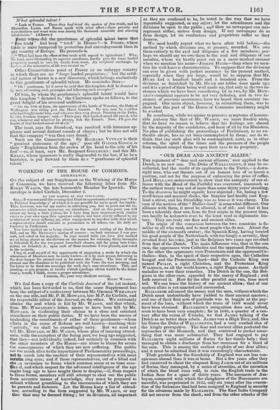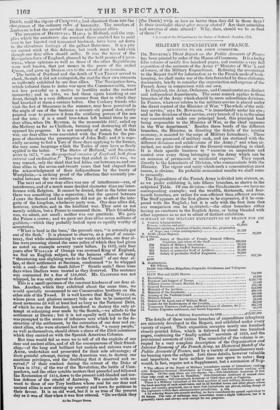"OUR DEAR AND ANCIENT ALLIES."
THE argument of" dear and ancient alliance," now applied to the Dutch, is no new one. The Duke of WELLINGTON, it may be recollected, had the credit of its application to the Turks,—a downright race, who cut throats out of an honest love of so heroic a pastime, and not for the purpose of enhancing the price of coffee. Lord HOLLAND eadeavoured to show that the antiquity of our alliance with the Head of the Faithful was overrated, inasmuch as the earliest treaty was not of more than some thirty years' standing. To the dearness he might equally have objected ; for, bating a few snuff-boxes and musical clocks, the Seignor had hardly cost England a stiver, and his friendship was as true as it was cheap. The case of the natives of the" Hollow-land" is somewhat different. Our alliance with them, it must be allowed, is of old; and that it has been a tolerably dear one, from its first origin to the present time, can hardly be unknown even to the least read in diplomatic history. They are truly our dear and ancient allies. The origin of the connexion between the two countries is fa miliar to all who read, and to most people who do not. About the middle of the sixteenth century, the Spanish King, having treated his good people of the Netherlands with too kingly a severity, they revolted from his yoke, just as the Belgians two years ago revolted from that of the Dutch. The main difference was, that in the one case, the oppressors were Catholics and the oppressed Protestants, in the other the oppresserS were Protestants and the oppressed CaIL-mhos—that, in the spirit of their respective ages, the Catholics hanged and the Protestants fined—that the Catholic King was named PHILIP, a right Christian, and the Protestant King WiLesnm, as all the world knows, a right Pagan name. As their maladies so were their remedies. The Dutch in the one, the Belgians in the other case, appealed to the mercy of England ; and both received it. How far the after parallel may run, time must tell. We can trace the history of our ancient allies ; that of our modern allies is yet unacted and unrecorded. ELIZABETH advanced the money and the men, without whichthe Dutch must undoubtedly have yielded to their ancient masters; and one of their first acts of gratitude was to boggle at the payment of the loan, without which the truce of 1609 would never have been obtained. ELIZABETH'S recognition does not, indeed, seem to have been very complete; for in 1603, a quarter of a century after the union of Utrecht, we find JAMES talking of the Dutch as no better than rebels. JAMES was a High Tory, and, like his Grace the Duke of WELLINGTON, had a very exalted idea of the kingly prerogative. The dear and ancient allies pocketed the reproaches of the Monarch, and they contrived to pocket something that was more substantial. They had engaged to pay ELIZABETH eight millions of florins for her timely help ; they managed to obtain a discharge from her successor for a third of the sum. This is among the earliest exploits of our dear allies; and it must be admitted that it was exceedingly characteristic.
Their gratitude for the friendship of England was not less con spicuous abroad than it was at home. But a few years after they had contrived to cheat the eloquent King JAMIE out of six millions of florins, they managed, by a series of atrocities, at the narration of which the blood runs cold, to ruin the English trade in the Indian Seas for a space of thirty years. The massacre of Amboyna, compared with which the slaughters of the Buccaneers are merciful, was perpetrated in 1622, only six years after the evacuation of the fortresses that had been assigned to England in security for the advances made by ELIZABETH. The East India Company did not recover from the shock, and from the other attacks of the
Dutch, until the vigour of Cemiwzr,e had chastised them into the obvIrvance of the ordinary riles of humanity. The murd.ers of .:-imboyna is feat the second of our dear and ancient allies. The reception of HENRIF_TTA. MARIA in Holland, and the supplies which the assistanecl she received there enabled her to send over to her bigoted and tyrannical husband, have been set down to the chivalrous feelings of the gallant Batavians. It is a pity we cannot wink at this delusion, but truth must be told even though our dear allies should suffer. It was the terror of the Navigation-laws of England, planned by the bold genius of CROM WELL, whose opinions as well as those of the other Republicans were well known, that put money in the purse of the exiled Queen, and gave up DORISLAUS to the sword of an assassin. The battle of Portland and the death of VAN TROMP served to check, though it did not extinguish, the zeal for their own interests
so unifoimly exhibited by our dear allies. The, Navigation-laws,
which induced them to make war upon the Commonwealth, were not less powerful as a motive to hostility under the restored monarchy; and in 1664, we had them again knocking at our doors, though in a very different manner from that in which they had knocked at them a century before. Our Cockney friends who visit the fort of Sheerness in the summer, may have perceived in the angle of one of the bastions a seventy-six pound shot, nicely painted over to preserve it from the oxidizing powers of the sun and the rain: it is a small love-token left behind them by our dear allies, when DE RUYTER, in the memorable 1667, sailed up the Medway as far as Chatham, burning and destroying all that
opposed his progress. It is not unworthy of notice, that in this war, our dear allies were associated with the French for the purpose of chastising the presumption of John Bull; and it is especially amusing to find a Tory of those days applying to the former, the very same language which the Tories of ours have so freely applied to the latter. "The States of Holland," said SHAF'TESBURY in 1673, " are the peipetual enemies of England, both from interest and inclination 1" The war that ended in 1674 was, we may remark, only the third that had fallen out between us and our dear allies in the seven-and-twenty years that had elapsed from the acknowledgment of their independence by the treaty of Westphalia,—a striking proof of the affection that anciently prevailed between the two nations.
The next act of our dear allies was one of interference—yes, of interference, and of a much more decided character than our interference with Belgium. It cannot be denied, that in the latter case there was something like a separation ; but the quarrel between JAMES the Second and his subjects did not go to affect the integrity of the kingdom, whichever party won. Our dear allies did, however, interfere, and in the kindliest way. They sent us not merely soldiers, but a Prince to command them. Their friendship was, we admit, not small ; neither was our gratitude. We gave the Prince a crown; and we gave our dear allies seven millions of guilders,—which they probably looked upon as equally worthy of acceptation.
"What is bred in the bone," the proverb says, "is not easily got out of the flesh." It is pleasant to observe, as a proof of consistency, that while administering to our wants at home, our dear allies were pursuing abroad the same policy of which they had given so noted an example seventy years before. In 1692, only four years after WILLIAM of Orange was crowned King of England, we find an English subject, for the heinous offence of using "` threatening and slighting words to the Council" of our dear allies, at their settlement at Surinam, condemned "to be whipped with a cord—that the death follow !" Gentle souls ! these were days when libellers were treated as they 'deserved. The sentence was commuted for a fine of 150,000/. Mr. CLIFFORD was not whipped, he was only starved to death. This is a small specimen of the constant kindness of out dear allies. Another, which they exhibited about the same time, we would specially recommend to our Conservative brethren on the other side of the Tweed. It is well known that King WILLIAM, whose pious and glorious memory bids as fair to be immortal as most memories (it will at least last as long as the National Debt, of which he was the founder), interfered to destroy the only attempt at. colonizing ever made by the Scotch,—we allude to the settlement at Darien ; but it is not equally well known that he was prompted to the series of infamous acts whieh led to the destruction of the settlement, by the entreaties of our dear and ancient allies, who were alarmed lest the Scotch, "a canny people," as well as themselves, should obtain a share of the illicit commerce which they carried on with the Spanish American Colonies.
But time would fail us were we to tell of all the exploits of our dear and ancient allies, and of all the consequences of their friendship,—of the long and brilliant but useless and ruinous wars of ANNE, undertaken and prosecuted for their sole advantage; of their grateful attempt, during the American war, to destroy our maritime privileges, and the drubbing that it deserved and received ;* of their conduct during the retreat of the Duke of Yortx in 1794; of the war of the Revolution, the battle of Camperdown, and the other notable matters that preceded and followed the Restoration of 1814, down to the present cold-blooded and useless defence of the citadel of Antwerp. We conclude with one word to those of our Tory brethren whose zeal for our dear and ancient allies is now stirring up country and town for petitions in their favour. It is an old word, but it is as true of the present day as it was of that when it was first uttered. "Do we think they At the Dogger Bans. [the Dutch] wi%'n or love us better than they did in those days ? Is their insatiable thirst titer money abated? Are their principles and maxims of state altered ? Why, then, should we be so fond of them ?".I.
Account of the Obligations to the States of Holland--London, 1711.



























 Previous page
Previous page